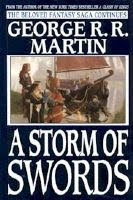 The Book of the Week is A Feast for Crows by George R.R. Martin. (Pocket #1 was scheduled to be the Book of the Week, but we're postponing that in favor of a different sort of #1.) This is the first American edition, signed and inscribed to me when Martin was at the Tattered Cover last week.
The Book of the Week is A Feast for Crows by George R.R. Martin. (Pocket #1 was scheduled to be the Book of the Week, but we're postponing that in favor of a different sort of #1.) This is the first American edition, signed and inscribed to me when Martin was at the Tattered Cover last week. George R.R. Martin has paid his dues since he began publishing in 1971. In the 1970s and early 1980s he wrote a variety of different types of fiction, including science fiction, fantasy, horror, and mainstream, all of which was beautifully written and won him critical acclaim and many awards, but none of which met with much commercial success. To make ends meet, he went to Hollywood in the mid-80s and spent ten years writing for television - if any of you remember a strange show called Beauty and the Beast, Martin was responsible for making that series much better than it had any right to be.
In 1996 he returned to writing novels with an epic fantasy series called A Song of Ice and Fire. Once again, however, his work was slow to find the right audience. The first volume of the series, A Game of Thrones (next week's Book of the Week), did not sell well and Martin did a disheartening signing tour, including one stop where he addressed a group of only four people, all of whom got up and left when he started to talk. When he toured for the second book in the series, he took a detour to meet with my science fiction & fantasy book group. Only a half-dozen of us were able to be there, since it was in the middle of a workday, yet Martin was very pleasant and friendly to those of us who made it.
After a slow start, each book in the Song of Ice and Fire series has been progressively more successful, due largely to word-of-mouth among Martin's devoted fans. A Feast for Crows, the fourth book in the series, was just released on November 8. Yesterday, it went to #1 on the New York Times bestseller list. Congratulations to George R.R. Martin on his long-overdue success.





